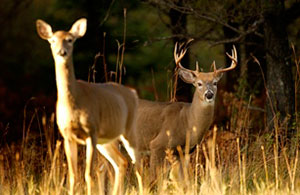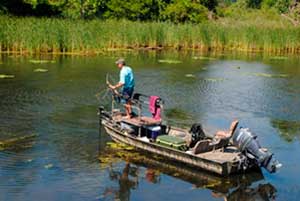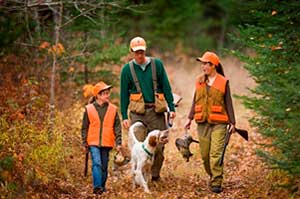- Details
(Provided by Michigan DNR)
 Michigan’s 2015 big-game, furbearer seasons look goodProspects for the 2015 Michigan big-game hunting and furbearer hunting seasons are very good, say DNR wildlife biologists. Michigan offers a diversity of species and a wide variety of seasons to maximize recreational opportunity.
Michigan’s 2015 big-game, furbearer seasons look goodProspects for the 2015 Michigan big-game hunting and furbearer hunting seasons are very good, say DNR wildlife biologists. Michigan offers a diversity of species and a wide variety of seasons to maximize recreational opportunity.
Here's a quick overview of some of the upcoming seasons:
Bear
Season: Bear licenses are issued by a preference-point system for specific time periods and geographic areas. A total of 6,951 licenses were available.
Hunting on the mainland of the Upper Peninsula runs Sept. 10-Oct. 26. On Drummond Island, the season is Sept. 10-Oct. 21. In the northern Lower Peninsula, the season is Sept. 20-28 and Oct. 2-8 (archery only) in the Red Oak unit; Sept 11-26 in the northern Baldwin unit and Sept 20-28 in the entire unit; and Sept. 20-28 in the Gladwin unit. In the Upper Peninsula, the first five days are for bait-only hunting only. In the Lower Peninsula the first day of the season is bait-only and the Red Oak archery-only season is bait-only. The last two days of the Red Oak, Baldwin and Gladwin area are dogs-only.
- Details
(Provided by Michigan DNR)
 Bowfishing - combining two pastimes into one sport.Roy Beasley grew up fishing, but when he discovered bowhunting, he changed his technique. He became a bowfisherman.
Bowfishing - combining two pastimes into one sport.Roy Beasley grew up fishing, but when he discovered bowhunting, he changed his technique. He became a bowfisherman.
“I still bass fish at my parents’ cottage or with the guys at work,” he said. “But I like doing this more.”
A research vessel captain with the DNR, Beasley is one of a growing number of sportsmen and women who like to combine hunting and fishing, using bows and arrows to take a wide variety of fish, including many that are generally not targeted by hook-and-line anglers.
Bowfishing is legal for bowfin, bullheads, burbot, carp (including goldfish), catfish, cisco, drum, gizzard shad, longnose gar, smelt, all species of suckers - including buffalo and quillback - and whitefish.
Beasley has taken most of them, including a number of Master Angler fish of six different species. But he particularly likes chasing gar and gizzard shad, because their narrow bodies make them more of a challenge.
- Details
(Provided by Michigan DNR)
The Michigan DNR's survey crews from the Charlevoix Fisheries Research Station headed out on Lake Michigan Aug. 24 to conduct surveys of yellow perch populations and other nearshore fish species. The surveys are being conducted from the research vessel Steelhead, as well as from smaller DNR vessels that permit sampling in shallow, nearshore waters. The surveys will run through September 11.
The DNR has been involved since 1995 in a lakewide collaboration with other Lake Michigan natural resources agencies to assess yellow perch. Data collected during these surveys is used to estimate a broad range of biological variables vital to understanding yellow perch populations in Lake Michigan and associated tributaries.
"Early indications from work in southern Lake Michigan by our sister agencies are that 2015 may be a banner year for yellow perch spawning and survival of young fish, so we're excited to get out and see what populations look like in Michigan waters," said Dave Clapp, Charlevoix Fisheries Research Station manager. "Fish hatched in 2010 and 2011 are just now reaching full maturity, so we expect to see an increase in spawning activity and an abundance of young perch this year, supported by increased lake levels and slightly warmer water temperatures this summer."
Survey operations will be conducted near the ports of South Haven, Grand Haven, Portage, Pentwater, Charlevoix and Petoskey. Vessels involved in the surveys will be docked at these Great Lakes ports, and the public is encouraged to visit the vessels and talk with crew members about fisheries assessment operations.
- Details
(Provided by Michigan DNR)
 Michigan releases its small game hunting outlook.Small game hunting season begins Sept. 1 with the opening of the early Canada goose season and teal seasons and continues until rabbit and hare season ends March 31. Michigan DNR wildlife biologists across the state say hunters should find conditions similar to last year. Hunters are reminded that due to changes in licensing, all licensed hunters may pursue small game.
Michigan releases its small game hunting outlook.Small game hunting season begins Sept. 1 with the opening of the early Canada goose season and teal seasons and continues until rabbit and hare season ends March 31. Michigan DNR wildlife biologists across the state say hunters should find conditions similar to last year. Hunters are reminded that due to changes in licensing, all licensed hunters may pursue small game.
Rabbits
Season: Cottontail rabbits and varying (or snowshoe) hare can be hunted from Sept. 15-March 31 Hunter with dog statewide. The daily bag limit is five in combination with a possession limit of 10.
Outlook: Roughly 56,000 hunters reported pursuing rabbits in 2011 (the most recently completed harvest survey) and about 12,000 hunted hares. Cottontail populations are good throughout their range over much of the state. Concentrate on thick cover, such as briar patches and brush piles, often near agricultural fields. Snowshoe hare populations are down from historic levels. Look for early-successional forests (such as aspen stands) and low-lying conifer swamps with blow-downs and brush piles in the northern two-thirds of the state.
- Details
 Mark ZonaArea anglers will have a chance to enjoy breakfast with four of the nation’s top bass fishing celebrities Aug. 22.
Mark ZonaArea anglers will have a chance to enjoy breakfast with four of the nation’s top bass fishing celebrities Aug. 22.
Kevin VanDam, Greg Hackney, Davy Hite and Mark Zona will appear that morning at the St. Joseph County Fairgrounds in Centerville, Mich. during a pancake breakfast to benefit the United Way.
All four anglers will be available between 8:30 and 10 a.m. for personal photographs and autographs. Admission is $5 per person and includes the pancake breakfast.
Zona and his wife Karin are Honorary Chairmen of the St. Joseph County United Way campaign.


